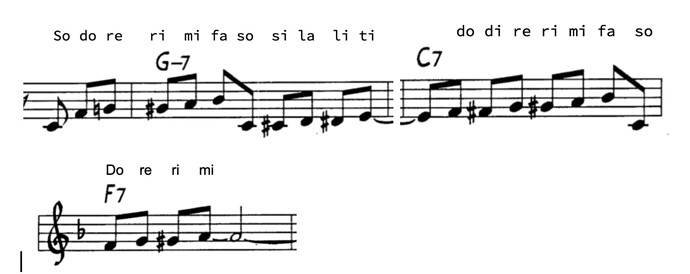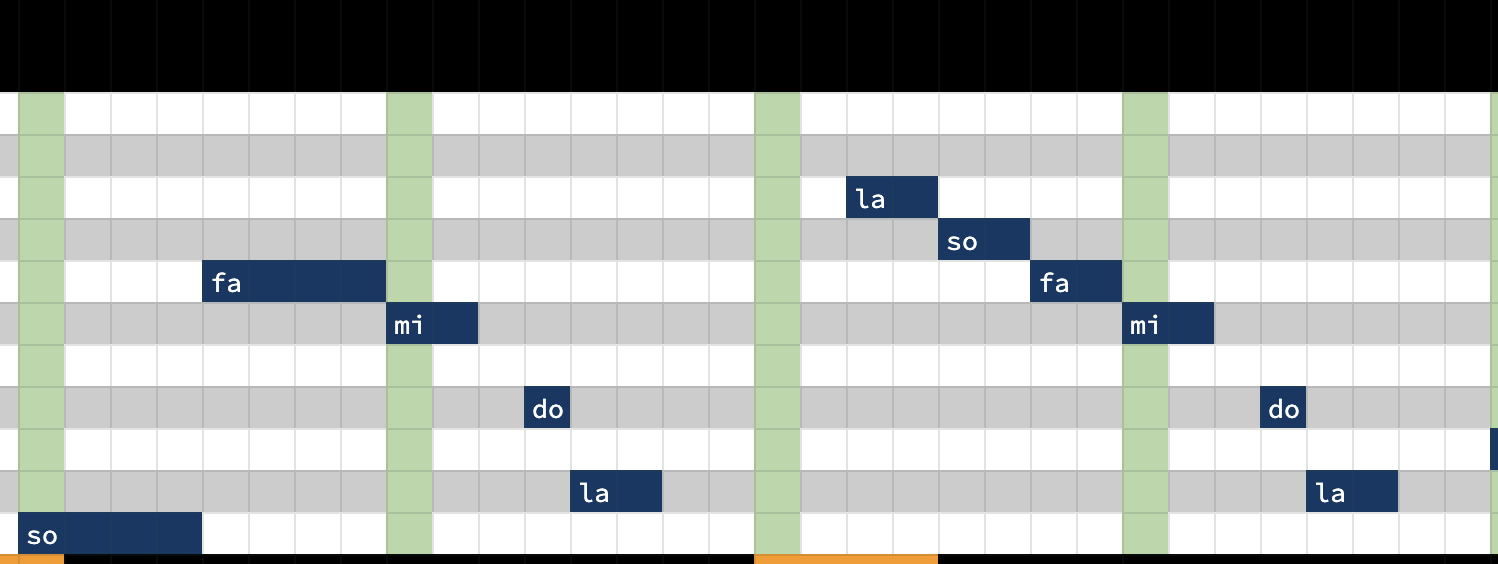Haha with as much as i am doing this it dont matter what degree you say any syllable and i could tell you degree number rofl! I struggled with the sharp syllables for a few days but once you do this 1000 times the other 5000 it just becomes so boring.
I need a way to use my deepmind 12 to play a random note via midi so i can change up this stupid piano rofl! At least with the deepmind I could listen to some far out synth tones.
Ok so I am able to kinda do it via midi ox by using the laptop keyboard to activate the deepmind which makes it harder to discern between white and black keys when reaching blindly. So for now I will utilize this when I am at the house. Mobile I will grind on the website.
Ok here we go. Random 50 note chromatic whole note on the slowest bpm generated midi file into audacity with midi on deepmind 12 ahh finally my ears get a vacation.
https://random-music-generators.herokuapp.com/melody
it has a custom pitches as well so this will be good for my variations but you gotta sign up.
Im starting to perceive this isnt that complicated in a single tone melody isolated. Its just a matter of hearing all the tritones in a big group, with the practice of shifting through them all. Basically 6 tones each with a tritone. Maybe thats why they have the hexachord as six notes.
Do
Major/Major (Tetrachord makeup)
Red
Do Tritone
Fi
In between Fa and So
Lydian/Major/Major/Minor
Purple/Red/Orange
Re
Minor/Minor
Yellow
Re Tritone
Si
In between So and La
Major/Minor/Minor/Phrygian
Orange/Yellow/Green
Mi
Phrygian/Phrygian
Blue
Mi Tritone
Li
In between La and Ti
Minor/Phrygian/Phrygian/b5Lydian
Green/Blue/Indigo
Fa
Lydian/Major
Purple
Fa Tritone
Ti
In between Li and Do
Phrygian/b5Lydian
Indigo
So
Major/Minor
Orange
So Tritone
Di
In between Do and Re
Major/Major/Minor/Minor
Red/Orange/Yellow
La
Minor/Phrygian
Blue
La Tritone
Ri
In between Re and Mi
Minor/Minor/Phrygian/Phrygian
Yellow/Green/Blue
Maybe this is the reasoning for six tones in the hexachord? The tritone?
Like listening for six tones, and their evil brothers rofl!
Maybe this tritone paradox has to do with peoples fixed do note.
http://deutsch.ucsd.edu/psychology/pages.php?i=206
Another surprising consequence of the Tritone Paradox concerns absolute pitch - the ability to name a note in the absence of a reference note. This ability is generally considered to be very rare. But the Tritone Paradox shows that the large majority of people possess an implicit form of absolute pitch, since on listening to this pattern they hear tones as higher or as lower depending simply on their pitch classes, or note names.
If anyone can find any information on this test she did with the Tritone so that I can see if F# is why I hear the scale on Do in atonality perfect pitch games.
I have a feeling if i isolate out these sets of tones for grinding do re mi, fi si li, and fa so la, ti di ri this game will be game over.
So in a way a Barry Harris was right its like a hierarchy of scales.
The other minor/wholetone tetrachord scale resides in melodic minor.
Its a matter of being really patient and trying to decipher in which set your note resides in do re mi or fa so la, but at the same time knowing it is ti di ri or fi si li also.
So the other good variations reside in both whole tone scales of the chromatic.
So it should be practiced with this in mind for beginner
Do
Do Re Mi
Do Re Mi So La
Do Re Mi Fa So La Ti Do
Then maybe Octatonics, and Major and Melodic Minor with upper tetrachord filled variations, maybe even setup phrygian and fill its upper tetrachord also.
Then both wholetone scales of the chromatic, and ending at the full chromatic.
Its like playing plinko your note gets thrown into this shifter it starts at chromatic then in the whole tone and gets segmented down through the 4 groups of 'do re mi’s, I wont get to much more complex but we could add the minor and phrygian aspect to this also do, re, ri and do, di, ri. Then you have to be able to aurally decipher upon which of the four do re mi set your note resides. But it requires some grinding and singing all your syllables to get to this point to use as a crutch when feeling stymed.
Like if I put the notes in B C F and F#, b is fa and f is ti, there is no way to unhear this, i cant be the only one. What gives! Rofl! These are all the main Do syllables. But we know C D E F G A B and F is Fa and B is Ti. So some how I am flipped.
C D E
F# G# A#
B C# D#
F G A
And maybe riding off this do re mi logic it would be best to use these syllables.
Do Ra Re Me Mi Fa Fi So Si La Li Ti
Ra and Me because thats where they fall in Do Re Mi.
So I was looking at these tritone pairs and this is what I discovered when I hear B to F its descending which is probably why i don’t hear B as Ti cause the resolution to the tonic is Ti Do this ascended cadence. But since I hear F to B that is ascended, that could be why. These are my pairs that I hear ascended.
D#,A
E,A#
F,B
F#,C
C#,G
G#, D
So if I try each one of these notes as the Ti Do only F to F# works. Freaky! The descending tritone pairs are just the opposite. And by Ti Do I mean like you are suppose to hear it from B to C. But it is so strong that without a doubt I know F# is my Do. ROFL! I can try every Ti Do pair, and nothing else has this quality to it but this specific pair.
tonesavvy.com if you guys put b and c you hear it as ti do right? or is this guy messing with my perception! f to f# is ti do for me and i believe it be because of the tritone paradox pairs. holy moley wish i couldve found this out when i was in my teens! rofl! my ear must be twisted up big time! mind blown! 
Whats even crazier is I only hear it mainly listening, if I actually play it they sound the same like in movable do… i can kinda sense it when I play and if I play the do re mi fa so la so fa mi re do ti do sequence in both keys C and F# I can sorta sense it but it fades fast when I am playing. But its clear as day only if I am listening. @.@


 and if there are different intervals woo buddy my brain is gonna splode.
and if there are different intervals woo buddy my brain is gonna splode.





